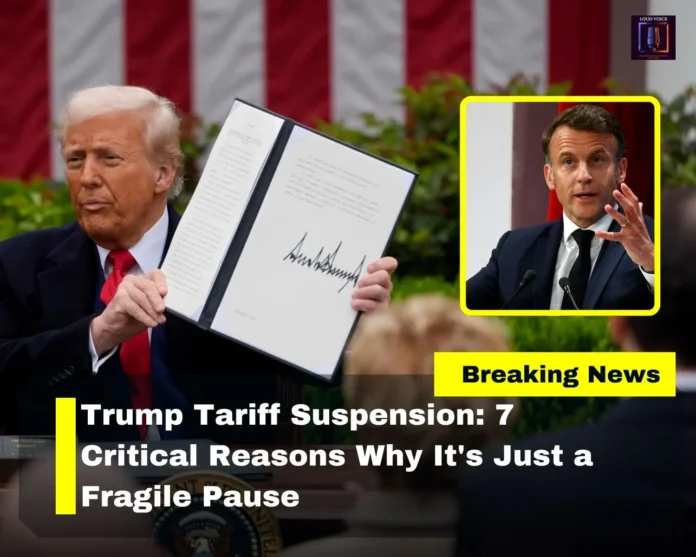Trump Tariff Suspension: Introduction
The Trump tariff suspension declared earlier this week is being labeled as a “fragile pause” by French President Emmanuel Macron—signaling ongoing uncertainty in global trade relations and financial markets.
On Friday, Emmanuel Macron took to X (formerly Twitter) to caution that the United States’ temporary lifting of certain tariffs should not be mistaken for a long-term solution. While the move may have opened the door for diplomatic negotiations, its fragile nature is sending mixed signals to investors, business leaders, and policymakers across the Atlantic.
In this article, we break down the seven key reasons why the Trump tariff suspension is far from a resolution—and why market jitters, including soaring gold prices, reveal deeper global concerns.
1. It’s Only a 90-Day Delay, Not a Policy Shift
Macron’s statement highlighted that the 90-day window offers a limited timeframe for productive talks. The temporary nature of the suspension leaves businesses with little reassurance that tariffs won’t be reinstated with little notice. Unlike a legislative reversal, this short delay offers no structural change to tariff policy.
2. Major Tariffs Are Still in Effect
Despite the pause, Macron emphasized that 25% tariffs on steel, aluminum, and automobiles and 10% tariffs on all other products remain firmly in place. These tariffs represent an estimated €52 billion ($58.8 billion) burden on the European Union, stalling growth, complicating supply chains, and increasing prices across industries.
3. Uncertainty Undermines Business Confidence
Industry insiders suggest that the ongoing unpredictability makes it nearly impossible for businesses to plan investments, sign new deals, or hire staff confidently. With only a 90-day grace period, the fear of an economic whiplash discourages long-term commitments from both U.S. and EU companies.
4. Financial Markets React with Volatility
One notable side effect of the tariff uncertainty has been a spike in gold prices, traditionally a safe haven during periods of market distress. Analysts interpret this trend as a sign that investors are hedging against policy instability, not embracing optimism about a U.S.-EU trade resolution.
5. Diplomatic Tensions Remain High

European leaders, led by Emmanuel Macron, are working to present a unified negotiating front. However, the underlying diplomatic strain remains unresolved. This fragile alliance could crack under pressure if tangible progress is not made before the 90-day deadline expires.
6. Lack of Transparency from the U.S. Side
While the suspension was announced by the Trump administration, details around future conditions or expectations have been scarce. Experts note that this lack of clarity is contributing to the confusion—making the so-called “pause” more of a geopolitical gambit than a step toward resolution.
7. Ripple Effects Beyond the U.S. and EU
Macron pointed out that the tariff suspension also affects businesses outside of the transatlantic bloc. Companies in Asia and Latin America that rely on global supply chains are left in limbo. The broader implication is a fragmented global trade ecosystem, where unpredictability is becoming the norm rather than the exception.
What Comes Next?
While negotiations between the U.S. and EU are expected to continue over the coming weeks, market observers remain skeptical about a comprehensive deal being reached within the 90-day window. Analysts warn that unless both sides commit to long-term policy adjustments, the return of tariffs could be swift—and more damaging than before.
For now, the Trump tariff suspension is less a sign of détente and more a strategic pause in an ongoing trade war. Whether this fragile peace holds—or collapses into renewed tension—remains to be seen.
Final Thoughts
The temporary nature of the Trump tariff suspension has prompted concern from European leaders, economists, and financial analysts alike. As Macron aptly put it, this move is a “fragile pause”—not a policy reversal. Until clarity and commitment are offered on both sides, the world watches and waits.


